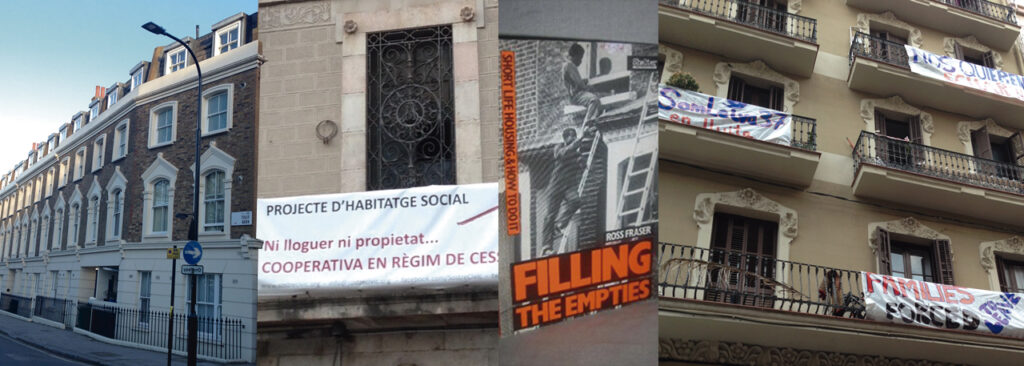
The research project Commoning Housing: Emerging Social Innovation across Spain and the United Kingdom is financed by the European Commission through the UAB’s P-Sphere COFUND programme, part of the Horizon 2020 Marie Sklodowska-Curie Actions programme (grant No 665919). Its aim is to analyse contextual and individual possibilities and barriers to practices of housing commoning, and identify and share transnational theoretical and methodological lessons through comparable case studies in Barcelona and London.
Investigator
Mara Ferreri is Marie Skłodowska-Curie research fellow at IGOP and the main investigator responsible for the project. She is a member of the URGOCIS research cluster (Urban Governance Commons and Social Innovation), coordinated by Dr Marc Parés.
Why commoning housing?
In contemporary Europe, the ‘housing question’ has arguably become anew a key site of analysis of social and economic crisis, as well as a site of resistance and propositional action. From the tenure insecurity and unfettered rise of the private rental market, to the demise or privatisation of formerly social housing, to unsustainable levels of household indebtedness through mortgages leading to widespread evictions and repossessions, in many European countries low and middle-income residents are affected by a housing crisis exacerbated by the 2008 global financial crisis, but whose roots and ramifications are only beginning to be fully and widely known. Calls to recenter urban political economy on housing have led to highlighting the role of flows of global financial capital in processes of dispossession and precarization of everyday social reproduction in cities. In this context, the critique of market actors has been paired with a critique of the role of the state in aiding and facilitating land and property accumulation by real estate actors, leading to dynamics of housing commodification and dispossession.This dual critique has given rise to a wide interest in forms of housing provision and management that are alternative to existing market as well institutional solutions, and which are increasingly defined through the language of urban commons.
In this context, this project aims to investigate imaginaries and practices of housing as collectively re-claimed, produced and reproduced (materially and immaterially) as a common good through its withdrawal from processes of value accumulation. While often statistically marginal, practices of commoning have the potential to transform not only imaginaries but also the relationship between homes, residents-users and wider urban governance. The project builds on a shift in understanding from commons as management of ‘resources’ to commoning as a verb (Linebaugh, 2012). Analysing such commoning requires simultaneously a critical mapping of what exists and an understanding of intentions, potentialities and capacities for furthering alternatives. Housing commoning is inextricably related to housing enclosures, which occur at a material level and at the level of the imaginary. Such dialectic of commons-enclosures is temporally and spatially specific, but not predetermined: in this, commoning can be understood as a generative spacing that responds and exceeds processes of enclosure (Jeffrey et al, 2012) through forms of spatial (re)claiming which can constitute a ‘radical politics of infrastructure’ (Vasudevan, 2015).
Research approach
The project’s research objectives are addressed through an immersive and mixed-method research design that combines semi-structured interviews, participant observation, case study research, archival and policy analysis. In London, interest in the political and social roots of fully-mutual co-operative housing has leading to archival research into short-life co-operatives which emerged from the politically organised squatting movement of the 1970s, and their transformation into permanent co-operative housing. In Barcelona, case studies will shed light on the relationship between housing movements and housing co-operatives for rental through cessiò d’us, an innovative form of affordable and users-led housing production and management. Through an asynchronous comparison, the project aims to develop new theoretical perspectives on the commoning of housing and home, and to critically inform local and transnational debates on issues of collective non-speculative ownership and organisation in global cities, and of democratic decision-making and its relationship to public policy and governance.